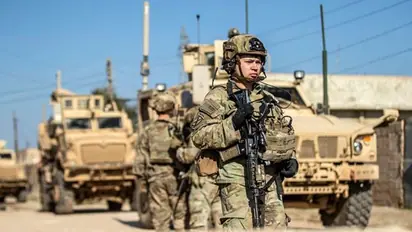Iraq's Kataib Hezbollah denies saying it was resuming attacks on US forces as base in Syria is targeted

Synopsis
The strike, which saw at least five rockets fired from the Iraqi town of Zummar, marks the first such incident since early February when Iranian-supported factions in Iraq ceased their hostilities against US troops.
Following reports indicating that Iraq's Kataib Hezbollah expressed its intent to resume attacks on US forces, the Iraqi terrorist group refuted claims of issuing a statement seemingly claiming responsibility for an attack on an American military installation in northeastern Syria. In a message posted on Telegram, Kataib Hezbollah described the statement circulating on social media as 'fabricated news'.
Monday's strike, which saw at least five rockets fired from the Iraqi town of Zummar, marks the first such incident since early February when Iranian-supported factions in Iraq ceased their hostilities against US troops. This development follows closely on the heels of Iraqi Prime Minister Mohammed Shia al-Sudani's return from a visit to the United States, during which he held discussions with President Joe Biden at the White House.
Following this reports surfaced that Kataib Hezbollah said Iraqi armed groups had decided to resume attacks on the US presence in the country after seeing little progress on talks to achieve the exit of American troops during al-Sudani’s visit to Washington.
“What happened a short while ago is the beginning,” the group reportedly claimed.
Rami Abdel Rahman, director of the Syrian Observatory for Human Rights war monitor, reported that multiple rockets were launched "from Iraqi territory at the Kharab al-Jir base" in northeastern Syria, where US forces maintain a presence.
A statement from the Iraqi security forces accused “outlaw elements of having targeted a base of the international coalition with rockets in the heart of Syrian territory”, at about 9:50pm local time.
Iraqi forces swiftly responded to the attack by launching a large-scale search operation in northern Nineveh province, successfully locating the vehicle used in the assault, as stated in an official announcement. The security forces subsequently destroyed the vehicle involved.
Following a period of relative calm, marked by a series of rocket attacks and drone strikes by pro-Iranian armed factions against US troops in the Middle East earlier in the year, tensions have reignited. In January, a drone strike claimed the lives of three US soldiers in the Jordanian desert near the Syrian border. In retaliation, the US military conducted strikes on numerous targets in Syria and Iraq, targeting pro-Iranian forces, a move that drew criticism from both governments.
Presently, the United States maintains approximately 2,500 soldiers in Iraq and nearly 900 across the border in Syria, as part of an international coalition formed in 2014 to combat the Islamic State group.
Check the Breaking News Today and Latest News from across India and around the world. Stay updated with the latest World News and global developments from politics to economy and current affairs. Get in-depth coverage of China News, Europe News, Pakistan News, and South Asia News, along with top headlines from the UK and US. Follow expert analysis, international trends, and breaking updates from around the globe. Download the Asianet News Official App from the Android Play Store and iPhone App Store for accurate and timely news updates anytime, anywhere.